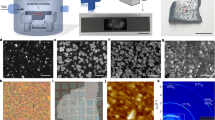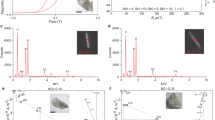Abstract
Three polymict ureilites have been identified as a subunit within the ureilite group of achondrites1: North Haig, Nilpena and the Antarctic meteorite EET 83309. They are characterized by their brecciated nature and the presence of lithic clasts and mineral fragments of rock types different from main-group ureilites (MGUs). Here we present analysis of the nitrogen isotope compositions of these three ureilites, which show them to be highly enriched in 15N; measured δ15N values reach +540‰, relative to air, but mass-balance calculations suggest a component of at least +600‰. Nitrogen in unbrecciated MGUs does not exhibit such unusual isotopic compositions. At least two nitrogen components exist, and analogies may be drawn with the Bencubbin meteorite (also an achondritic breccia), but no definite connection can be made. We favour a hypothesis that calls for the introduction of isotopically heavy nitrogen into polymict ureilites during a brecciation event caused by a more primitive, possibly carbonaceous chondrite-like projectile.
This is a preview of subscription content, access via your institution
Access options
Subscribe to this journal
Receive 51 print issues and online access
$199.00 per year
only $3.90 per issue
Buy this article
- Purchase on Springer Link
- Instant access to full article PDF
Prices may be subject to local taxes which are calculated during checkout
Similar content being viewed by others
References
Prinz, M. et al. Lunar planet. Sci. 18, 802–803 (1987).
Grady, M. M. et al. Geochim. cosmochim. Acta 49, 903–915 (1985).
Grady, M. M. & Pillinger, C. T. Meteoritics 21, 375–376 (1986).
Kerridge, J. F. Geochim. cosmochim. Acta 49, 1707–1714 (1985).
Becker, R. H. Lunar planet Sci. 18, 52–53 (1987).
Grady, M. M. et al. Geochim. cosmochim Acta 50, 2799–2813 (1986).
Franchi, I. A. et al. Nature 323, 138–140 (1986).
Prombo, C. A. & Clayton, R. N. Science 230, 935–937 (1985).
Becker, R. H. & Pepin, R. O. Earth planet. Sci. Lett. 69, 225–242 (1984).
Prinz, M. et al. Abstr. 12th Symp. Antarctic Meteorites 60–62 (National Institute of Polar Research, 1987).
Lovering, J. S. in Researches on Meteorites (ed. Moore, C. B.) 179–197 (Wiley, New York, 1962).
Weisberg, M. K. et al. Abstr. 50th Meeting Meteoritical Soc. 186 (1987).
Prinz, M. et al. Lunar planet Sci. 18, 800–801 (1987).
Takeda, H. Earth planet. Sci. Lett. 81, 358–370 (1987).
Goodrich, C. A. et al. Geochim. cosmochim. Acta 51, 2255–2274 (1987).
Author information
Authors and Affiliations
Rights and permissions
About this article
Cite this article
Grady, M., Pillinger, C. 15N-enriched nitrogen in polymict ureilites and its bearing on their formation. Nature 331, 321–323 (1988). https://doi.org/10.1038/331321a0
Received:
Accepted:
Issue Date:
DOI: https://doi.org/10.1038/331321a0
This article is cited by
-
Evolution of ureilites
Nature (1988)
Comments
By submitting a comment you agree to abide by our Terms and Community Guidelines. If you find something abusive or that does not comply with our terms or guidelines please flag it as inappropriate.



